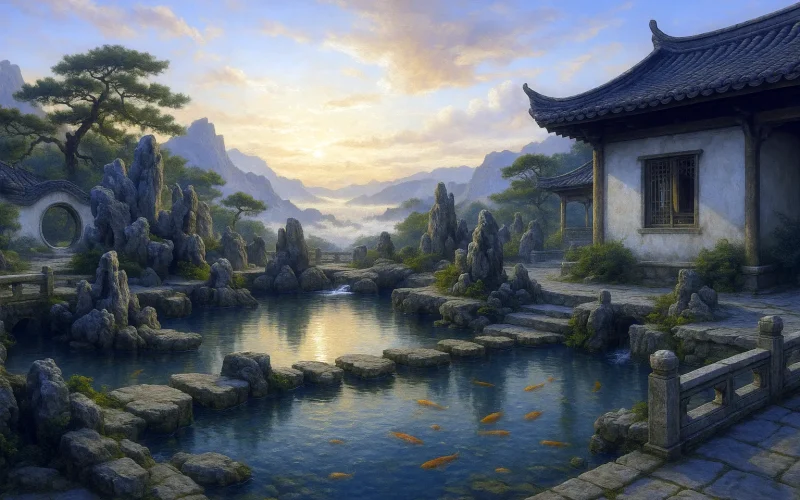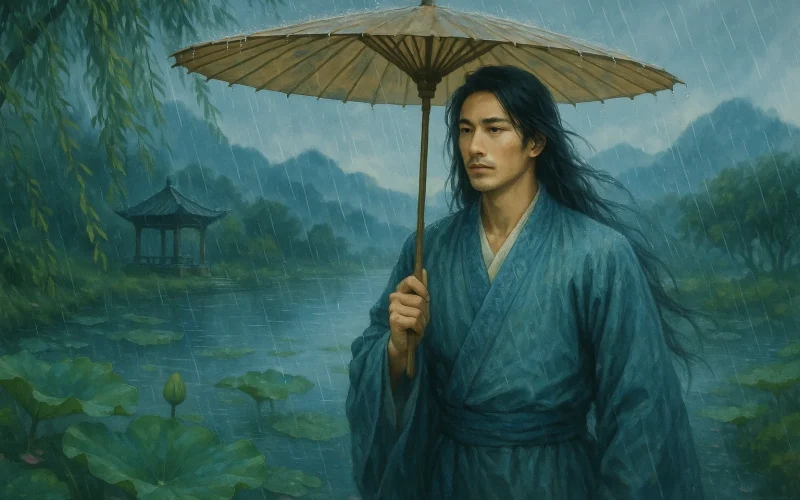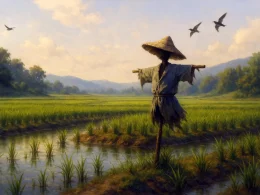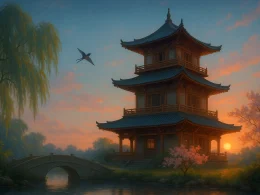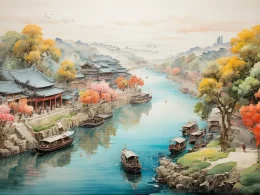This immortal lord loves the Way divine,
His pond carved like Isles of Blest design.
Fish follow their whims in joy and play,
Boats drift or stay as they may.
Like Qin folk who knew fowl from hound,
Or Yao’s men who hermits found.
Returning home past my wicker gate,
I’m charmed by twilight’s tranquil state.
Original Poem
「题沈东美员外山池」
綦毋潜
仙郎偏好道,凿沼象瀛洲。
鱼乐随情性,船行任去留。
秦人辨鸡犬,尧日识巢由。
归客衡门外,仍怜返景幽。
Interpretation
This poem was composed during the mid-Tang Dynasty, a period of relative stability when scholar-officials often vacillated between political engagement and reclusive aspirations. Qiwu Qian, renowned for his landscape and reclusive poetry, embodied a tranquil disposition, disdaining worldly power while embracing Daoist ideals of simplicity and natural harmony.
Shen Dongmei, a friend of Qiwu and a minor official (yuanwai, rank 6b), shared this philosophical inclination. In his leisure, Shen constructed a mountain pool modeled after the mythical Penglai Isles—a celestial realm in Daoist lore where immortals dwelled. Among Tang literati, such gardens were not merely physical retreats but spiritual sanctuaries, symbolizing an idealized existence detached from worldly clamor.
Upon visiting this secluded haven, Qiwu was deeply moved by its serenity and composed this poem—both a tribute to his friend’s refined taste and a meditation on the allure of reclusion.
First Couplet: "仙郎偏好道,凿沼象瀛洲。"
Xiān láng piān hào dào, záo zhǎo xiàng Yíngzhōu.
This immortal-minded lord, devoted to the Way,
carved a pool in likeness of Penglai’s isle.
The term "immortal-minded lord" (仙郎) conveys Shen’s transcendent spirit, blending admiration for his demeanor with his philosophical leanings. By likening the pool to Penglai (瀛洲), a fabled abode of Daoist sages, Qiwu elevates the garden beyond mere scenery into a microcosm of celestial harmony.
Second Couplet: "鱼乐随情性,船行任去留。"
Yú lè suí qíngxìng, chuán xíng rèn qùliú.
Fish delight, following their nature’s course;
boats drift, unbound by stay or departure.
Here, nature and human artifice merge seamlessly. The fish, embodying ziran (自然, spontaneity), thrive without constraint, while the boats—untethered and directionless—mirror the Daoist ideal of wuwei (无为, effortless action). This couplet encapsulates a world where freedom and harmony reign supreme.
Third Couplet: "秦人辨鸡犬,尧日识巢由。"
Qín rén biàn jī quǎn, Yáo rì shí Cháo Yóu.
Like Qin’s folk who knew each fowl and hound,
or Yao’s era that revered Chao and You.
Qiwu employs two classical allusions to underscore the pool’s idyllic purity. The first references the Peach Blossom Spring parable, where Qin refugees lived in utopian seclusion, attuned to nature’s rhythms. The second recalls the sage-king Yao’s reign, when recluses like Chao Fu and Xu You were honored—implying that Shen’s retreat fosters both simplicity and sagely recognition.
Fourth Couplet: "归客衡门外,仍怜返景幽。"
Guī kè héng mén wài, réng lián fǎn jǐng yōu.
I, a wanderer homeward-bound, pause by his bramble gate,
lingering still, enamored by twilight’s hushed glow.
The closing lines evoke a poignant farewell. The "bramble gate" (衡门), symbolizing rustic humility, frames Shen’s unpretentious abode, while "twilight’s hushed glow" (返景幽) bathes the scene in a transient, almost sacred light. The verb "enamored" (怜) carries a tender melancholy, suggesting that the poet’s departure is bittersweet—his heart tethered to the pool’s quiet majesty.
Holistic Appreciation
This poem, inspired by the mountain pond of Shen Dongmei, depicts the poet's ideal realm of reclusion. Shen Dongmei, a man of quiet refinement and Daoist inclinations, crafted his pond in imitation of the legendary Penglai Isles—a perfect reflection of the Tang dynasty literati's admiration for a life of "tranquil inaction." The opening lines, "The immortal gentleman favors the Way, / His pond carved in Penglai's image," not only define the protagonist's character but also establish an ethereal atmosphere for the entire poem.
The first two couplets paint a scene where "the human world meets the divine." Fish swim freely in the pond, boats drift at will—an ideal realm where nature and humanity exist without barriers. This is more than mere scenery; it is a projection of the poet's soul, yearning to break free from worldly constraints and return to inner freedom.
The third couplet shifts from reality to illusion, elevating the pond to an idealized realm through two allusions: "The Qin people discern chickens and dogs" and "Yao's era recognized Chaoyou." The former evokes the purity and harmony of ancient hermits' lives, while the latter praises the recognition of noble character and virtuous talent. Here, the poet not only describes the environment but also extols an idealized society where ancient virtues endure and worthy individuals are recognized.
The final couplet returns to the perspective of the "returning traveler," transitioning to dusk outside the gate. The lingering glow of sunset bathes the mountain pond in serene tranquility. Though the poet has departed, he remains captivated by the scene, reluctant to leave. This conclusion conveys both nostalgia for the beauty before him and a profound longing for the ideal reclusive life.
The poem is concise yet effortlessly weaves between scenery and allusions, blending real landscapes, historical references, and the poet's inner world to create an artful realm of quiet elegance.
Artistic Features
- Fluid Narrative Perspective
The poem alternates between depicting Shen Dongmei's temperament and life and expressing the poet's personal experience as a "returning traveler." This interplay of narrative and lyricism allows readers to appreciate both the beauty of the setting and the poet's emotions. - Unity of Scene, Emotion, and Philosophy
The scenery is not merely descriptive but symbolic of ideals and reflections. The freedom of fish and boats represents liberation of the soul, while the allusions mirror an idealized social order and moral integrity. - Natural Integration of Allusions
References like "The Qin people discern chickens and dogs" and "Yao's era recognized Chaoyou" are drawn from classical texts but blend seamlessly into the poetic landscape, enriching its cultural depth and historical resonance without appearing forced. - Subtle and Thought-Provoking Conclusion
The line "Still, I cherish the returning light's serenity" avoids direct praise, instead using the word "cherish" to convey emotion subtly, leaving room for endless reflection.
Insights
This poem conveys not only the Tang literati's ideal of reclusion but also a philosophy of life—amid the clamor and toil of the world, one must still preserve a tranquil space for oneself. It reminds us that even in the fast-paced modern world, we can seek our own "Penglai," whether in nature or within our hearts.
Moreover, the poem teaches us that cultural enrichment lies not in ostentatious accumulation but in spiritual resonance. By harmonizing natural scenery with allusions to ancient sages, the poem sustains cultural continuity and lends historical depth to contemporary life. For modern readers, this is a form of "spiritual breathing"—finding balance among nature, history, and the self, infusing life with poetry and peace.
About the Poet
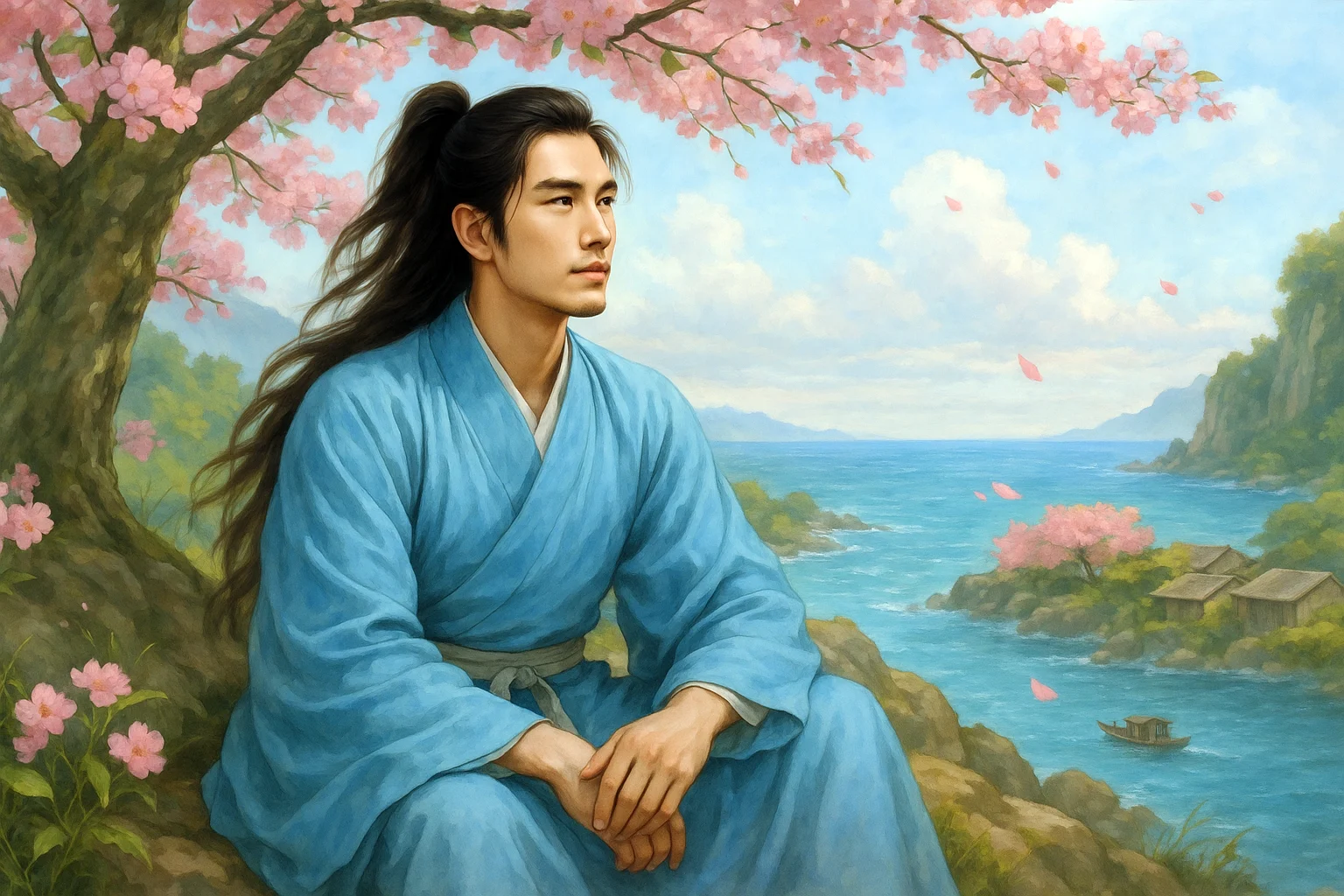
Qiwu Qian (綦毋潜 692–c. 755), a native of Ganzhou (modern-day Ganzhou, Jiangxi), was a representative poet of the Landscape and Pastoral School during the High Tang period. He earned the jinshi degree in 726 (the 14th year of the Kaiyuan era) and held official positions such as Right Reminder (You Shiyi) and Editorial Director (Zhuzuo Lang) before retiring to the Jiangnan region. His poetry, renowned for its depictions of reclusive life and natural landscapes, is characterized by a serene and understated style. He exchanged poetic works with Wang Wei, Meng Haoran, and other literary figures. The Complete Tang Poems (Quan Tangshi) preserves 26 of his poems, which stand out distinctly within the High Tang landscape poetry tradition and significantly influenced the development of later Zen-inspired poetry.






